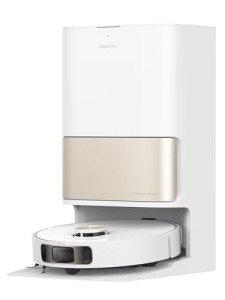Robotic Vacuum Cleaner Comparison: The Future of Home Cleaning
Over the last few years, robotic vacuum cleaners have actually transformed the method we preserve cleanliness in our homes. With advancements in innovation and the incorporation of synthetic intelligence, these gadgets have actually evolved from mere novelty items to essential family home appliances. This post offers a detailed comparison of some of the leading robotic vacuum cleaners on the market, assisting consumers make informed decisions when picking a model that fits their requirements.
Understanding Robotic Vacuum Cleaners
Robotic vacuum are self-governing machines designed to clean floorings instantly. Geared up with self cleaning vacuum , they navigate around challenges and adjust their cleaning routes for maximum effectiveness. The crucial features that differentiate different models consist of suction power, battery life, app connectivity, navigation technology, and price.
Key Features to Consider
When comparing robotic vacuum cleaners, potential buyers must take into consideration the following elements:
- Suction Power: Measured in Pascals (Pa), suction power determines the efficiency of getting dirt and debris.
- Battery Life: The length of time a vacuum can run before needing a recharge considerably affects its cleaning efficiency.
- Navigation Technology: Models might utilize basic random navigation or sophisticated mapping innovations (like LIDAR) that allow them to produce a map of the home.
- Smart Features: Connectivity to mobile phone apps or smart home systems can boost usability and control.
- Filter Type: HEPA filters are suggested for allergy sufferers, as they trap allergens and enhance air quality.
Comparison of Top Robotic Vacuum Cleaners
Below is a comparison table of some of the very best robotic vacuum available in 2023:
| Model | Suction Power (Pa) | Battery Life (minutes) | Navigation Technology | Smart Features | Price (GBP) |
|---|---|---|---|---|---|
| iRobot Roomba i7+ | 1700 | 75 | Smart mapping | App control, voice command | ₤ 949 |
| Roborock S7 | 2500 | 180 | LIDAR | App control, multi-floor | ₤ 649 |
| Neato D7 | 2000 | 120 | LIDAR | App control, zone cleaning | ₤ 599 |
| Ecovacs Deebot T10 | 3000 | 150 | Smart mapping | App control, space detection | ₤ 799 |
| Shark IQ Robot | 1200 | 90 | Random | App control, self-emptying | ₤ 399 |
Explanation of the Table
- iRobot Roomba i7+: Known for its robust cleaning ability, it features smart mapping technology that allows it to designate specific locations for cleaning. Its self-emptying feature is a plus for convenience.
- Roborock S7: This design excels in suction power and battery life, making it perfect for bigger homes. Its LIDAR innovation assists develop an effective cleaning course, and it can vacuum and mop all at once.
- Neato D7: The D-shape design permits for better corner cleaning, and it features strong suction power. Its LIDAR navigation allows it to map out cleaning areas precisely.
- Ecovacs Deebot T10: Boasting the highest suction power and advanced navigation, this design can deal with several floors efficiently. It's a versatile option for households with differing floor types.
- Shark IQ Robot: An affordable alternative that still uses smart functions. Its self-emptying ability and app integration make it a practical choice for those trying to find a solid cleaning buddy without breaking the bank.
Advantages of Robotic Vacuum Cleaners
Robotic vacuum offer numerous benefits that contribute to their increasing popularity amongst consumers:
- Time-Saving: Automated cleaning enables users to free up valuable time that can be invested in other activities.
- Convenience: Many designs can be scheduled by means of apps to clean up at specific times, minimizing manual effort.
- Availability: They can reach under furnishings and in tight spaces where conventional vacuums might have a hard time.
- Daily Maintenance: Regular use of robotic vacuums can assist preserve a consistently clean environment, promoting better overall home hygiene.
FAQs About Robotic Vacuum Cleaners
1. How typically should I run my robotic vacuum?
It is advised to run the robotic vacuum a minimum of 2-3 times a week to maintain tidiness, though daily usage can be helpful, particularly in homes with animals or high foot traffic.
2. Do robotic vacuums deal with carpets?
Yes, lots of robotic vacuums are designed to work on carpets, however efficiency might vary based upon the design's suction power and brush type. Look for designs specifically discussed as effective for carpets.
3. Can robotic vacuums clean pet hair?
The majority of robotic vacuums can efficiently select up pet hair, however those with strong suction and tangle-free brush styles are especially well-suited for this task.
4. How do I preserve my robotic vacuum?
Routine maintenance includes cleaning the brushes and sensing units, clearing the dustbin, and periodically changing filters to guarantee ideal performance.
5. Are robotic vacuums worth the financial investment?
While they tend to be more costly than conventional vacuums, the benefit, effectiveness, and time-saving aspects make them a worthwhile financial investment for numerous households.
The market for robotic vacuum continues to broaden as innovation evolves, offering consumers a variety of choices to suit different cleaning requirements and budgets. By thoroughly thinking about functions such as suction power, battery life, and smart capabilities, users can select a design that lines up with their way of life. Whether for convenience, ease of usage, or exceptional cleaning efficiency, robotic vacuums are unquestionably reshaping the future of home cleaning.

